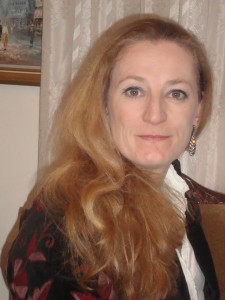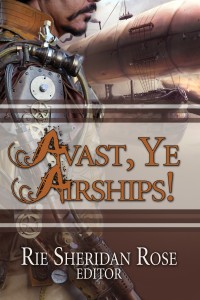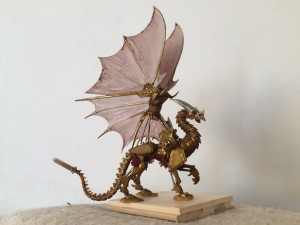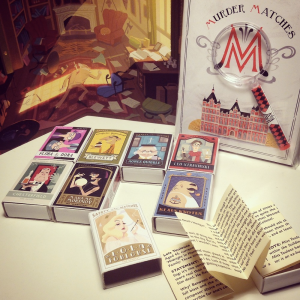The fun continues today as I interview another author with a story appearing in the anthology Hides the Dark Tower. To obtain this interview, I had to travel all the way to Greece…well, virtually.
 N.A.O. Rawle is a British writer, teacher and translator living and working in mythical Thessalian Plain in Greece. She graduated from Manchester Metropolitan University with a degree in Creative Writing and Philosophy. After many years of procrastinating, she took the plunge and has started publishing short sci-fi/horror/fantasy stories. She’s had over a dozen short stories and poems published. She’s been published in the anthology Once Bitten, and The Girl at the End of the World, Book II and the anthology Denizens of Steam.
N.A.O. Rawle is a British writer, teacher and translator living and working in mythical Thessalian Plain in Greece. She graduated from Manchester Metropolitan University with a degree in Creative Writing and Philosophy. After many years of procrastinating, she took the plunge and has started publishing short sci-fi/horror/fantasy stories. She’s had over a dozen short stories and poems published. She’s been published in the anthology Once Bitten, and The Girl at the End of the World, Book II and the anthology Denizens of Steam.
Here’s the interview:
Poseidon’s Scribe: How did you get started writing? What prompted you?
N.A.O. Rawle: First, thank you for having me on your blog, it’s great to talk to you. I grew up with books as my dad was a librarian. He had a study stuffed floor to ceiling with books, mostly about fly fishing and theology, but that’s where I got the bug. The actual writing started with fan fiction when I was in Secondary school and progressed into photocopied comic books in my late teens. Published work came a lot later.
P.S.: What other authors influenced your writing? What are a few of your favorite books?
N.R.: Harder to answer than I imagined. I can’t say who has influenced my writing style as I don’t think I’ve really found my own. (At the moment I’m going through a phase of stories in rhyming prose and that comes straight from Dr Seuss and ‘The Night Before Christmas’!) Once I had finished James Herbert’s The Magic Cottage, I remember thinking “I should like to do that.” I love Clive Barker, Anne Rice, Iain M. Banks, George Orwell, John Steinbeck, Bret Easton Ellis, Harlan Ellison and Bruce Sterling…
P.S.: In your blog, you’ve mentioned having thirty writing projects going at once, in various stages. Have you accepted that as a normal state of affairs for you, or would you prefer to be more focused?
N.R.: That’s normal. I live by flitting from one thing to the other and half finished projects everywhere, and I don’t mean just writing. I can focus and do occasionally, to the point of obsessive! That’s when work gets done fast.
P.S.: What are the easiest, and the most difficult, aspects of writing for you?
N.R.: Being asked to do edits is the hardest. Not because I’m too proud and don’t want to change what I’ve written but because I find incorporating another’s perspective bewildering. Will it look right to the reader? Have I clarified and tidied up the waffle? The easiest is writing. I can sit and type for hours and hours.
P.S.: Your bio mentions your British nationality, your current work location in Greece, your teaching and translation work, and your education in creative writing and philosophy. In ‘Core Craving’ and ‘Those Who Can, Do,’ you touch on two of those aspects. In what other ways do your varied background and education inspire your stories?
N.R.: I’ve done (counts on fingers and gives up) many jobs since the age of fifteen so there’s always a bit of those experiences in my writing but it’s not necessarily what I know about them. In ‘Those Who Can, Do’ I was more interested in the fact that so many teachers appear to have forgotten the purpose of their jobs and get into some sort of power place ‘us’ and ‘them’. I also had some hideous teachers at school who really didn’t understand that the colour of my shirt was not a factor in the learning process. Greece crops up in my work frequently, I’ve spent almost half my life here now and it would be weird for it not to feature. A character might come from someone I’ve met or the atmosphere of a place might inspire a scene, I’m always trying to paint a picture so that my reader can see what I do.
P.S.: It appears you’re participating in NaNoWriMo (the National Novel Writing Month) for the first time this year. How is that going?
N.R.: It’s going…I did it in the hope that I could complete one of those projects I’ve been composting for about a decade as there is outside interest in it after a short story grew from some of the remnants that I had cut from the original work. (‘Synchronysi’ due to be published in the New Year). If I can get the plot down then I know I’ll get it sorted.
P.S.: Lately, you’ve been writing some steampunk stories. Why does that genre appeal to you?
N.R.: It’s what Goths do when they discover brown, or so a friend of mine tells me. No, I like that I can mix up fancy frocks with feminism and mechanical monsters! Oh and rhyming prose, ‘A Walk in the Park’ is the first story I’ve self-published that is Steampunk in Denizens of Steam, an anthology that I helped ‘curate’ to promote the Scribbler’s Den writing forum on the Steampunk Empire.
P.S.: You’ve guest-blogged for Rie Sheridan Rose about your story ‘Core Craving’ in ![Pageflex Persona [document: PRS0000039_00001]](https://stevenrsouthard.com/wp-content/uploads/2015/10/HidesTheDarkTower-DigitalCover-FINAL2-200x300.jpg) Hides the Dark Tower and mentioned the research you did on the castle. Had that story idea been kicking around in your mind before the anthology’s call for submissions, or did it all click together afterward?
Hides the Dark Tower and mentioned the research you did on the castle. Had that story idea been kicking around in your mind before the anthology’s call for submissions, or did it all click together afterward?
N.R.: The story was fully formed but had not found a home. Vonnie and Kelly [editors Vonnie Winslow Crist and Kelly A. Harmon] made it welcome in Hides the Dark Tower, an anthology, which is a real treat to read and an honour to be included in! ‘Core Craving’ is such a small story but one that took a long time to build and the first one published which is set in my home town (I have several others) so I’m pleased it’s found its niche amongst so many respected authors.
P.S.: Among your many current Works in Progress (or, as you have quipped, Works in Procrastination), would you mind telling us a little about one of them?
N.R.: I have a story called ‘Touched’ which has been simmering for a long time (read years). It’s a fantasy/horror mishmash involving fae folk who live in the beautiful Greek mountain forests. (I am told, in all seriousness, that fairies do reside there.) I have so much written but on an ancient word processor whose disks I have been unable to print up anywhere since the WP died on me. I’ve been trying to remember the story but there are big gaps in the plot and I am so sad. I’m patching it up but it’s beginning to resemble Frankenstein’s monster not the glorious creation I envisaged. In my heart I know I can make it good but I need determination.
Poseidon’s Scribe: What advice can you offer aspiring writers?
N.O.A. Rawle: Jim Morrison wrote “Words dissemble, words be quick, words resemble walking sticks, plant them and they will grow…”
Sow the seeds of stories and see what becomes of them. Some will become roses and others prickly thistles that you’ll need to weed out. Like plants, some tales are therapeutic and others poisonous. Some will charm you with their beauty and there will be down-right ugly ones; they will all teach you something about writing but only if you keep tending them.
Thanks, Naomi! I know readers of my blog will want to find out more about you, and, luckily, I have that information handy. You have a blog and you’re on Facebook, Twitter, and Goodreads. You also appear on Google+, Pinterest, and Amazon as N.O.A. Rawle, and on Steampunk Empire as Lady Naomi.
Poseidon’s Scribe






